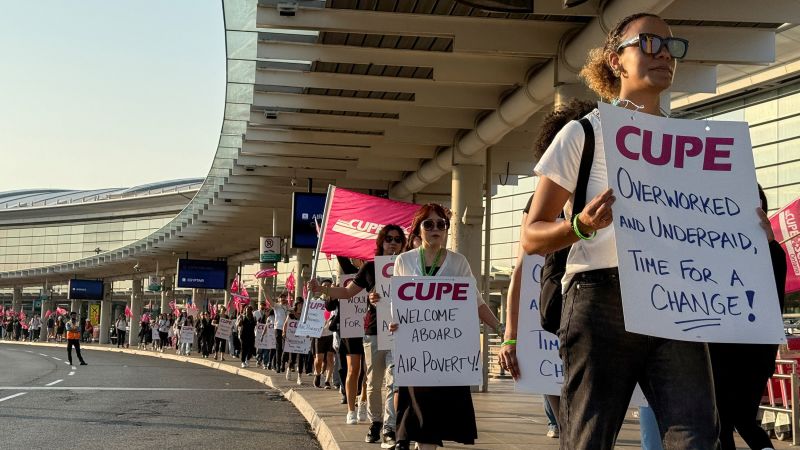In a significant development in labor relations, over 10,000 flight attendants of Air Canada remain steadfast in their strike action despite directives from the federal government aimed at returning them to work. The Air Canada sector of the Canadian Union of Public Employees (CUPE) announced this decision on Sunday, emphasizing their commitment to the strike despite ongoing pressures.
The union’s communication reassured the striking members of their rights during this dispute: “At this time, you are still on Strike and Locked out! Please remember while we are locked out there is no obligation to be in contact with the employer, no responsibility to check Globe or your work email or to contact them for reassignment or reserve duties,” stated a recent update from the union’s committee. This statement reinforces the flight attendants’ determination to stand united against what they perceive as unfair labor practices.
The Canadian government, through Jobs Minister Patty Hajdu, has intervened in the matter by utilizing Section 107 of the Canada Labor Code to address the ongoing strike. Minister Hajdu instructed the Canadian Labor Relations Board (CLRB) to compel Air Canada employees to return to their duties, framing this intervention as essential for maintaining industrial harmony that would safeguard the interests of the broader Canadian economy and its citizens. This government action reflects an underlying tension between labor rights and governmental obligations to ensure economic stability.
Air Canada itself had requested this governmental intervention earlier, as the company sought resolution amidst growing tensions with its workforce. The airline emphasized the urgency of resuming operations to mitigate disruption, which has coincided with the ongoing strike and labor unrest.
Despite these external pressures, Air Canada is poised to restart its flight operations, signaling a strategic move to resume normalcy in its services while the strike continues. The situation remains fluid, with both sides entrenched in their positions.
The marginalized voice of the striking flight attendants is further heard in their recent actions, which include a striking mandate that was backed by a staggering 99.7% vote in favor of the strike last week. Employees launched their walkout around 1 a.m. ET on Saturday, making their demands clear for wage increases and compensation for work stoppages when aircraft are grounded.
Wesley Lesosky, president of the Air Canada sector of CUPE, articulated the union’s frustrations, accusing the Canadian government of infringing upon the strikers’ rights. He pointed out the disparity between the well-padded profits of Air Canada and the compensation provided to the airline’s flight attendants. Lesosky expressed a sentiment of injustice, highlighting a situation where underpaid workers are expected to continue working without appropriate compensation while the company enjoys significant financial gains.
In a bid to resolve the ongoing conflict, Air Canada has reportedly offered its employees a substantial salary increase, proposing a total compensation bump of 38% over four years, with an initial hourly raise of 12% to 16% in the first year. However, industry analysts note that the acceptance of such offers remains contingent upon the union’s assessment of the proposed terms against their needs and expectations.
In response to criticism related to governmental interference in union activities, Jobs Minister Hajdu clarified the situation, asserting that the government’s aim is not anti-union but rather an effort to facilitate resolution, emphasizing the necessity for arbitration to finalize impending negotiation points.
As the dispute unfolds, both the employees of Air Canada and the Canadian government continue to navigate this complex labor landscape, with public interest heavily weighing in on the outcomes that will impact thousands of workers and the traveling public alike. In the meantime, the public awaits further developments as tensions remain high and the issue of labor rights continues to surface in the broader economic discourse. CNN’s Paula Newton contributed insights to this ongoing news story, reflecting the ongoing interest and implications this labor strike has on the Canadian aviation sector and beyond.











